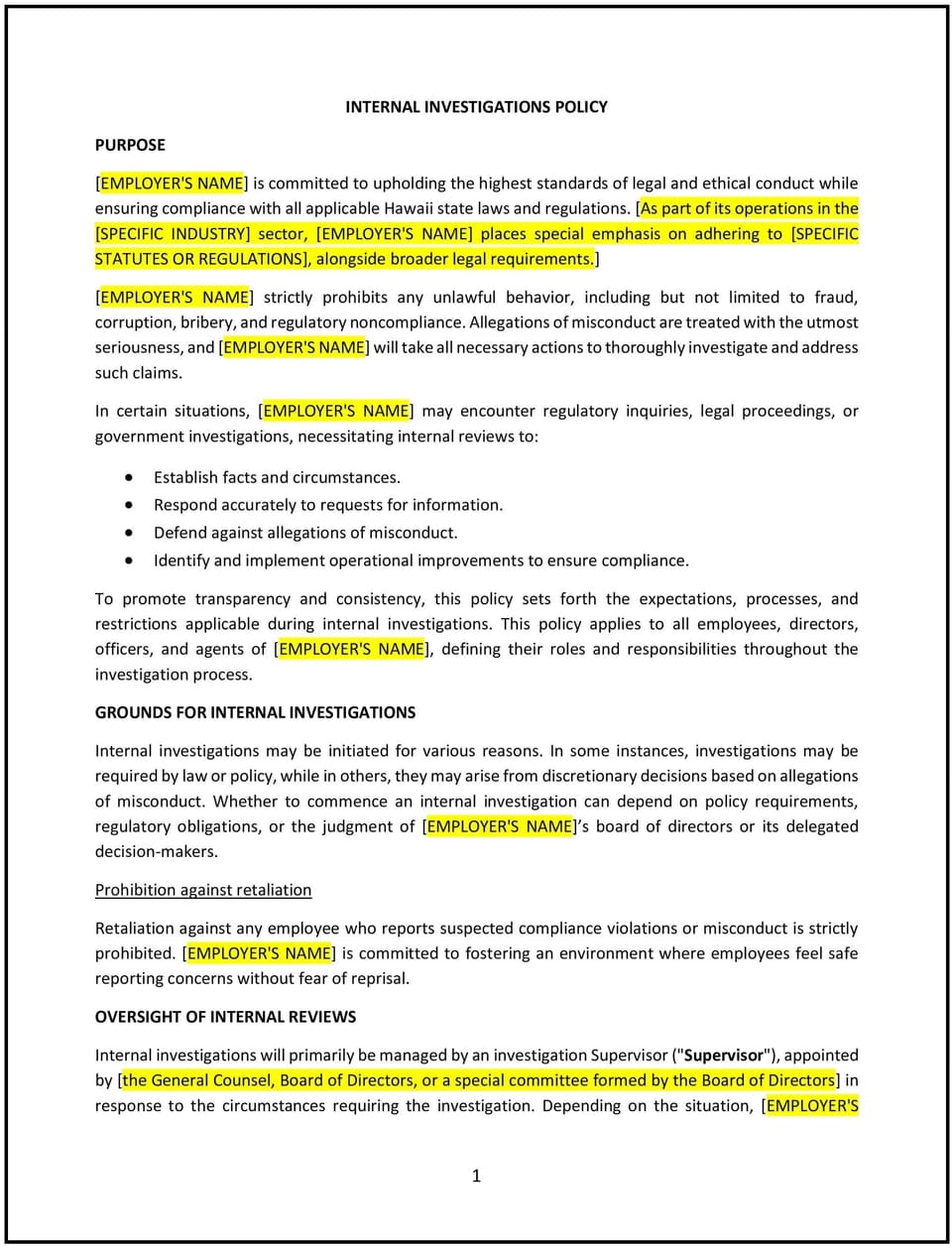Internal investigations policy (Hawaiʻi): Free template

Internal investigations policy (Hawaiʻi)
An internal investigations policy helps Hawaiʻi businesses establish guidelines for conducting fair, thorough, and impartial investigations into workplace concerns, such as misconduct, harassment, or policy violations. This policy outlines procedures for initiating, conducting, and resolving investigations, while addressing Hawaiʻi’s unique legal and cultural considerations. It is designed to promote transparency, accountability, and trust within the workplace.
By implementing this policy, businesses in Hawaiʻi can address issues promptly, protect employee rights, and maintain a positive and respectful work environment.
How to use this internal investigations policy (Hawaiʻi)
- Define investigation scope: Specify the types of concerns that may trigger an investigation, such as harassment, discrimination, theft, or safety violations.
- Establish investigation procedures: Outline steps for initiating and conducting investigations, including gathering evidence, interviewing witnesses, and documenting findings.
- Assign responsibilities: Designate roles for conducting investigations, such as HR personnel, legal counsel, or external investigators, depending on the issue’s complexity.
- Ensure confidentiality: Protect the privacy of all parties involved by limiting access to investigation details and maintaining strict confidentiality.
- Address retaliation: Clearly state that retaliation against employees who report concerns or participate in investigations will not be tolerated.
- Communicate the policy: Share the policy with employees during onboarding and through internal communications to ensure awareness and understanding.
- Train investigators: Educate HR staff and managers on how to conduct fair and impartial investigations in accordance with the policy.
- Monitor compliance: Regularly review investigation processes to ensure adherence to the policy and address any issues promptly.
- Review and update the policy: Regularly assess the policy’s effectiveness and make adjustments as needed to reflect changes in laws, workplace dynamics, or business needs.
Benefits of using this internal investigations policy (Hawaiʻi)
This policy offers several advantages for Hawaiʻi businesses:
- Promotes fairness: A structured investigation process ensures all concerns are addressed impartially and consistently.
- Protects employee rights: Clear procedures safeguard employees’ rights to report concerns and participate in investigations without fear of retaliation.
- Enhances trust: Demonstrating a commitment to addressing workplace issues fosters trust and confidence among employees.
- Reduces risks: Thorough investigations help prevent legal disputes, regulatory penalties, or reputational damage.
- Supports accountability: Employees and managers understand their responsibilities for reporting concerns and cooperating with investigations.
- Aligns with legal requirements: The policy helps businesses comply with Hawaiʻi state laws and federal regulations related to workplace investigations.
- Improves workplace culture: A transparent and fair investigation process contributes to a positive and respectful work environment.
Tips for using this internal investigations policy (Hawaiʻi)
- Communicate the policy effectively: Share the policy with employees during onboarding and through regular reminders, such as emails or training sessions.
- Provide training: Educate HR staff and managers on how to conduct fair and impartial investigations in accordance with the policy.
- Be consistent: Apply the policy uniformly to all investigations to avoid perceptions of bias or favoritism.
- Maintain confidentiality: Protect the privacy of all parties involved by limiting access to investigation details and handling sensitive information discreetly.
- Encourage reporting: Create a culture where employees feel safe reporting concerns without fear of retaliation.
- Monitor compliance: Regularly review investigation processes to ensure adherence to the policy and address any issues promptly.
- Review the policy periodically: Update the policy as needed to reflect changes in laws, workplace dynamics, or business needs.
Q: Why should Hawaiʻi businesses adopt an internal investigations policy?
A: Businesses should adopt this policy to address workplace concerns fairly, protect employee rights, and maintain a positive work environment.
Q: What types of concerns should trigger an investigation?
A: Concerns such as harassment, discrimination, theft, safety violations, or policy breaches should trigger an investigation.
Q: How should businesses conduct investigations?
A: Businesses should follow structured procedures, including gathering evidence, interviewing witnesses, and documenting findings, to ensure fairness and thoroughness.
Q: How should confidentiality be maintained during investigations?
A: Businesses should limit access to investigation details and handle sensitive information discreetly to protect the privacy of all parties involved.
Q: What should businesses do to prevent retaliation?
A: Businesses should clearly state that retaliation against employees who report concerns or participate in investigations will not be tolerated.
Q: What training should businesses provide to investigators?
A: Businesses should educate HR staff and managers on how to conduct fair and impartial investigations in accordance with the policy.
Q: How often should the policy be reviewed?
A: The policy should be reviewed annually or as needed to reflect changes in laws, workplace dynamics, or business needs.
This article contains general legal information and does not contain legal advice. Cobrief is not a law firm or a substitute for an attorney or law firm. The law is complex and changes often. For legal advice, please ask a lawyer.


